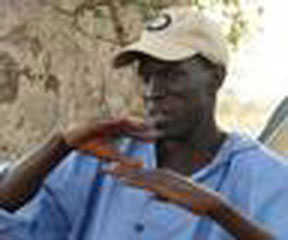Decades ago in the Sudanese desert, the rival tribes of Dep Tuany and Salva Dut fought each other over scarce and precious resources — "over river, over cattle, over land," says Tuany. But today, these two refugees work together to bring life back to their shared homeland.
When they were young, both men were "Lost Boys" — two of the thousands of children orphaned by the civil war in the Sudan. (Orphaned girls did not often make it to refugee camps; they were usually raped, killed, sold into slavery, or taken in by other Sudanese families). The war devastated the country's resources, killed more than 2 million people, and displaced 4 million more.
Separated from his parents during the war, 11-year-old Salva joined fellow villagers on the long journey to a refugee camp in Ethiopia, and was helped into the United States by a church in New York State. He was in college when he learned that his father was alive, in a UN hospital back in the Sudan. After a 16-year separation, Salva Dut traveled home to reunite with both his mother and father, and his life took on a whole new purpose.
"My father was ill because he didn't have drinking water," Mr. Dut remembers. "The doctor told him to drink clean water. But there was no clean water in my village."
That's when Water for Sudan was born — a well-digging operation Dut created to bring clean water to the southern Sudan.
Water is the foundation of life in this desert country, but it's in short supply and in many areas dries up for months of the year. Some village women and children walk for hours daily to collect water. And even when there is water, it's shared between animals and humans, used for washing and drinking, and harbors many diseases.
Sudan's surface water is contaminated, but there's an underground aquifer with plenty of clean water. Water for Sudan rigs can dig wells up to 200 feet deep to access this supply.
At first, Water for Sudan brought wells to the land of the Dinka — Salva Dut's tribe. But when they expanded operations to include Nuer villages — Dep Tuany's part of the country — Mr. Tuany and his local rotary club in San Diego got involved. Tuany had already been helping refugees by running a community center for them, but he wanted to do more. He knew from experience how precious clean water is. During his own family's escape to Ethiopia, his 14-month-old son died because of contaminated water.
Now, a new well is going in to Tuany's home village, where his mother still lives. "I will be the one to give her a cup of water," he says. "It will be so beautiful!"
To date, Water for Sudan has dug 17 wells serving 51,000 people. Both Dep Tuany and Salva Dut spend half the year in the US and half in the Sudan, working on Water for Sudan. Their working together, despite the history of fighting between their tribes, is a sign of new hope and possibility. "For my people seeing me work with Salva, with the Dinka, is a great thing," says Tuany, who predicts the collaboration will bring more than just clean water to their shared homeland, but also "so much unity, so much love and goodwill."
Update: Water for South Sudan has now drilled so many wells (282), the drill they affectionately call the Iron Giraffe is wearing out. Salva Dut is leading a campaign to replace it before it collapses completely—school children all over the world are chipping in. A best-selling book, A Long Walk To Water, tells the story of what the Iron Giraffe has achieved.
When the organization drills a village well, it also does health education sessions in that village and works to heal the wounds of war with peace and reconciliation talks.
Dep Tuany went on to run the South Sudan Community Center in San Diego, helping refugees from his home country adjust to life in the US.

